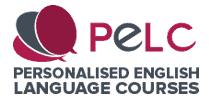How to relearn a language effectively
The topic of “how to relearn a language” has been doing its rounds in my mind for a good few weeks.
Let’s see how I’ve been getting to grips with Polish again after an eight-year break from speaking the language.
back to the start - MY HEART WAS IN THE RIGHT PLACE
My first contact with Polish was on a coach that departed from Nottingham at 09:45 on a warm June morning in 2005. I was with my friend, Paweł. The destination - Kraków.
On the coach, I was surrounded by vodka-swigging Polish people with their ham sandwiches and boiled eggs. Positively intrigued, I was all ears to the conversations going on around me. Paweł also taught me a few basic greetings and phrases on the way to Poland.
Frankly, I could have done more to master Polish between my first visit, in 2005, and the end of my first full year living and working in Poland. I taught English in the town of Dębica between September 2006 and June 2007. Certainly, I had a lot of work in the first year of my teaching career. However, I wouldn’t like to use that as an excuse for my lack of effort when it came to learning Polish.
When I was bored in Dębica (a lot of the time!), I would occasionally flick through my copy of Polish in 4 weeks.
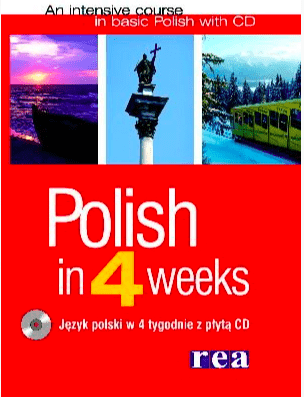
The dialogues in the book are very contrived. Nevertheless, I did pick up some useful phrases and 'chunks' of language. Miraculously, I still remember phrases like fajna knajpa, prawda? (great bar, right?).
IMMERSION AND FORMAL STUDY
Between 2009 and 2013, I immersed myself more deeply in Polish. I spent more time in the homes of Polish families. Moreover, I had a lady friend who was a fully-qualified Polish teacher so I was able to pick her brain whenever I liked.
YOU DON’T FORGET THE BASICS
Going back to Polish in 4 weeks.
I don’t know where that book is right now. However, I’m sure that if I flicked through it again, then I would recognise most of the dialogues. I believe that I’d quickly commit most of the phrases to memory.
I don’t believe you can fully forget or "lose” a language. Perhaps we can compare my current state of Polish to the life of a plant. Like a plant that goes dormant during the cold winter months, it’s almost as if my Polish entered a period of suspended animation - for eight years between 2013 and 2021.
During those years I barely used Polish at all, it’s as if the outer leaves died. In other words, I lost my spoken fluidity, as well as control over grammar and the seven cases of noun and adjective declensions.
Nevertheless, there was still life lurking somewhere in the roots. In other words, I never forgot basic greetings, key words and phrases, as well as some of the most common grammatical elements, such as the nominative case.
Back in Gdańsk in 2020, I found that I could still manage to get by in shops and other public places where I had to use Polish. Maybe I wasn’t very grammatical, but I could communicate what I needed to.
HOW TO RELEARN A LANGUAGE: CONSOLIDATE AND FOCUS ON WHAT YOU CAN GLEAN FROM CONTEXT
In my last post, I reviewed polyglot Kató Lomb’s method of learning foreign languages.
Essentially, Lomb read novels in foreign languages in order to fathom their grammatical and lexical systems.
For Lomb, context was key. She’d refuse to use a dictionary at first reading. Lomb only concentrated on those words and phrases which she either recognised or could work out from context. She would then copy out these words in their original context. For Lomb, writing words out in isolation wasn’t helpful.
After subsequent readings of a novel, Lomb looked up unknown words in a dictionary and recorded the most useful ones in her notebook, together with contextual information.
THERE’S LIFE IN THE OLD DOG YET
Positively enthused by Lomb’s method and book, How I Learn Languages, I bought a book in Polish which I assumed that I would find mildly entertaining.
The book I chose in my local supermarket is called Blondynka u szymana by Polish journalist, Beata Pawlikowska.
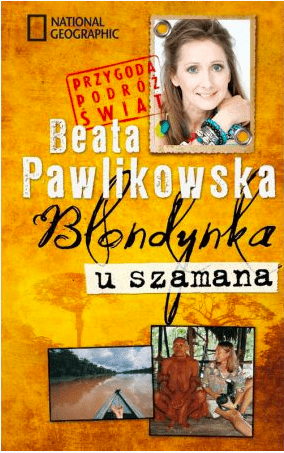
In keeping with Lomb’s belief that one should select “interesting” books to learn a language, I figured that I wouldn’t find anything better than reading about a journey through a south American jungle.
You can’t go wrong with a good travel adventure, can you?
Anyway, I don’t want this relearning process to be a mundane chore.
I would really like my passion for the Polish language to grow.
Frankly, I won’t get very far if I become too obsessed with mastery and fluency.
I CAN STILL READ IN POLISH - A SMALL MIRACLE
When I started reading Blondynka u szamana, I thought that I wouldn’t be able to do what Lomb did AT FIRST READING. Namely, focus solely on those words that I recognised or could work out from context. As previously mentioned, Lomb was against using dictionaries during the first reading.
Honestly, I didn’t expect that I’d be able to understand so many complex sentences. Yet, from the get-go, I got the feeling that I would be able to get the gist of Pawlikowska’s thoughts and descriptions even though there were many words I didn’t know.
In the very first paragraph, I caught the essence of Pawlikowska’s initial impressions of Herkules, her guide in the Amazon jungle:
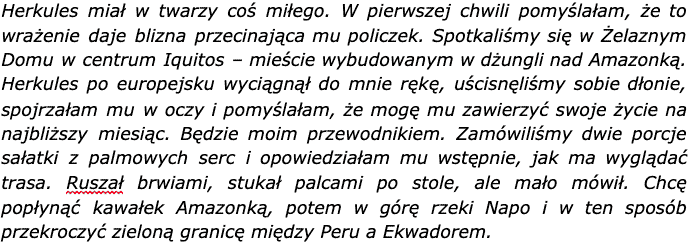
First of all, there are a few words, phrases and verb forms in the opening paragraph that I simply didn’t know. These include blizna, przecinająca, stukał palcami and wyciągnął.
Nevertheless, plenty of phrases, clauses, words and grammatical items did come flooding back to me.
For instance, I immediately recognised the following:
- past tense forms - miał (he had), mówił (he spoke), zamówiliśmy (we ordered) and spotkaliśmy się (we met)
- random words - policzek (cheek), między (between) and miesiąc (month)
- short phrases and chunks - w ten sposób (in this way), mieście wybudowanym (built-up place/area) przekroczyć granicę (cross the border)
- instrumental case - Będzie moim przewodnikiem (he’ll be my guide) and między Peru a Ekwadorem (between Peru and Ecuador)
- accusative case - przekroczyć zieloną granicę
- locative case - w pierwszej chwili (at first; initially) and w centrum (in the centrum)
I learned the ins and outs of the aforementioned cases back in 2012. The fact that I recognise them and am able to deduce the rules (again) by myself is extremely motivating. I don’t think I have to start doing gap-fill exercises to get to grips with the cases. Instead, I’ll just carry on reading, noticing and deducing the rules for the endings without referring to any grammar books. For me, this is how to relearn a language. It's all about familiarisation and deduction.
It’s already sunk into my brain that, in the accusative case, the ending for adjectives after certain verbs changes from -a to ą, while the noun changes from -a to ę. Hence, przekroczyć zieloną granicę.
Whether I can produce this grammar in live speech is another issue. On my side, however, I do have a high level of self-consciousness when I speak foreign languages.
A MAN WITH A METHOD
Lomb preferred to use a book’s margins for note-taking. “Untidy glossaries”, as she called them.
In Lomb’s eyes, memory flourishes amid messiness, different colours and writing instruments and various writing styles (slanting, upright, capital letters, small letters, etc.).
I don’t doubt Lomb’s logic for a moment. Indeed, I might try it out with my next book.
However, for now I’m satisfied with using a Word-Phrase Table to record all pertinent words and phrases, as well as the context they appear in:
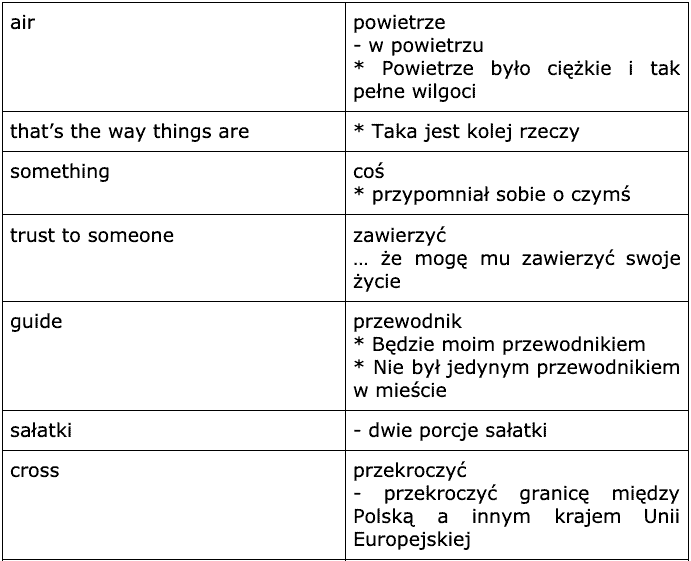
Of course, when recording new words and phrases, you don’t have to be bound by the context in a book.
With the word “cross”, for example, I searched google and found przekroczyć granicę między Polską a innym krajem Unii Europejskiej. Hence, cross the border between Poland and another EU country has more relevance in my life than przekroczyć zieloną granicę (which refers to crossing a border frontier in South America).
CONTEXT IS A WONDERFUL THING
There have been a few cases where I’ve been able to work out the meaning of words and phrases by using contextual clues.
In the following example, Nie tak łatwo oddalić się od cywilizacji, I knew that Nie tak łatwo means it’s not so easy. Furthermore, od cywilizacji means from civilisation. Therefore, given that Pawlikowska was in a jungle a long way away from “civilisation”, I deduced that the verb oddalić się must mean to get away from or distance oneself from.
Another example. In, kiść zielonych bananów, I had never come across the word kiść before. However, with zielonych bananów (green bananas) after it, what else could it have meant except a bunch of …?
WILL LOMB’S READING METHOD HELP ME SPEAK POLISH?
It’s too early to say whether Lomb’s reading method will help me speak Polish fluidly.
However, the early signs look promising.
My main aim is to be able to transfer words and collocations from the book into my own speech.
Well, when haggling over the price of a car just recently, I remembered obniżyć ceny (lower the price) from the book and used it in the negotiation.
CONCLUSION
If you’re wondering how to relearn a language, I really do believe in the value of reading a good novel or true story.
Perhaps Lomb put it best:
to go from incomprehension to half-understanding to complete understanding is an exciting and inspiring journey of discovery worthy of the spirit of a mature person. By the time I finish the journey, I part with the book feeling that this has been a profitable and fun enterprise.
Kató Lomb
Polyglot
Frankly, I don’t have to learn Polish. Everybody in large Polish cities such as Gdańsk seems to speak English quite well. Even the pen-pushers in local Government offices seem more willing to speak English than they used to be.
Yet, I’m doing this for the same reasons Lomb referred to in the quotation above.
It's the journey of discovery that keeps me going.
Polish language - I’m back. And I’m going to emerge victorious.
